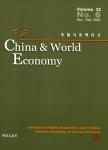R&D,Human Capital Investment and Productivity:Firm-level Evidence from China's Electronics Industry
R&D,Human Capital Investment and Productivity:Firm-level Evidence from China's Electronics Industry作者机构:National Central University Jhongli Taiwan Tamkang University Tamsui Taiwan Chung-Hua Institution for Economic Research Taipei Taiwan
出 版 物:《China & World Economy》 (中国与世界经济(英文版))
年 卷 期:2010年第18卷第5期
页 面:72-89页
核心收录:
学科分类:12[管理学] 0202[经济学-应用经济学] 02[经济学] 1201[管理学-管理科学与工程(可授管理学、工学学位)] 020205[经济学-产业经济学]
主 题:insurance productivity R&D training
摘 要:Usingfirm-level panel data covering 2005-2007, the present paper examines the effects of R&D and human capital investment on productivity in China's electronics industry. It is found that both R&D and on-the-job training positively contribute to total factor productivity (TFP). Firms' investment inemployees' health insurance andpensions, whichare components of workers' compensation, generate a productivity-enhancing effect, supporting the efficiency wage hypothesis. The estimated impact of R&D on productivity varies among different forms of ownership, and foreign-owncd enterprises experience higher R&D efficiency than state or private enterprises. After controlling for potential endogenous causality between TFP and R&D, the above findings remain unchanged We also find that on-the-job training can improve the quality of human capital and is helpful in promoting productivity. Therefore, establishing indigenous technological capability through various technological sources is quite important, and the government should devote further effort to investing in human capital.



